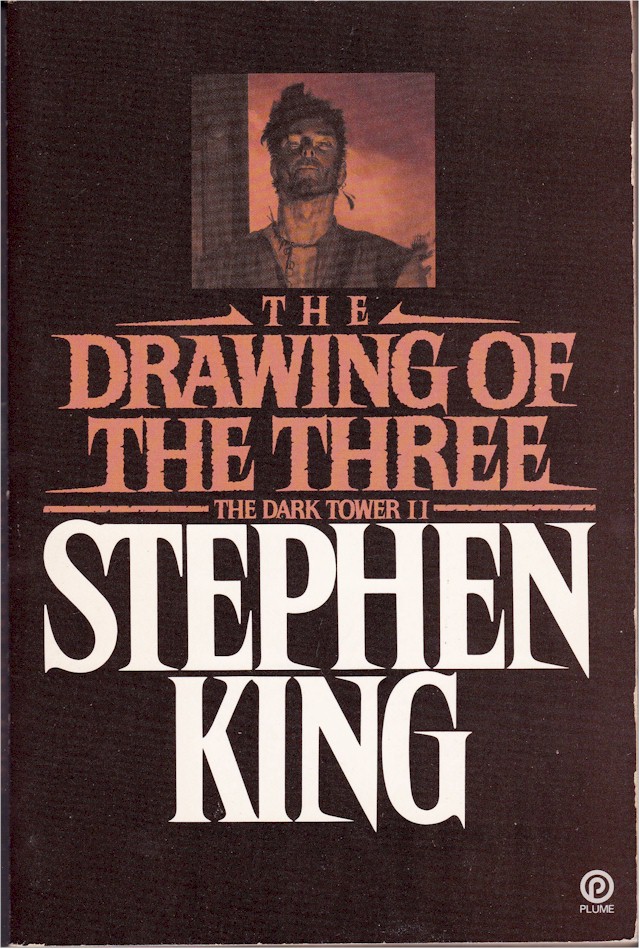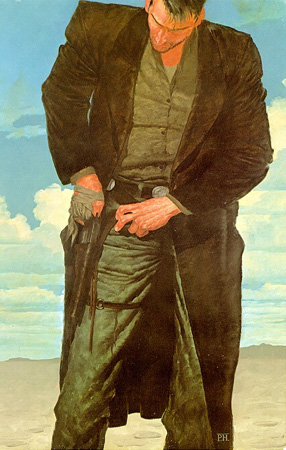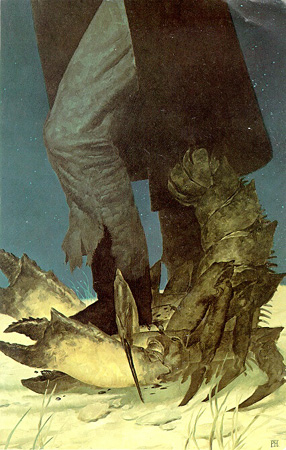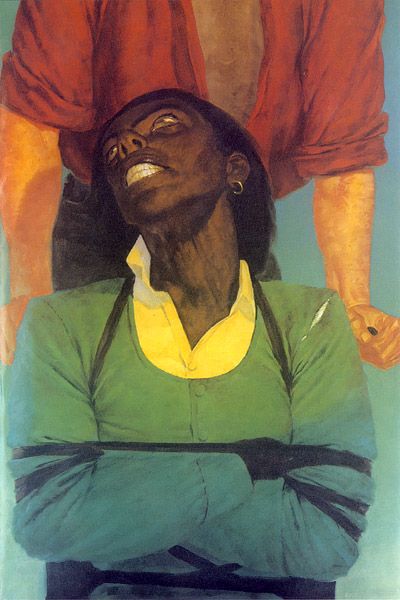In anticipation of Nikolaj Arcel’s upcoming screen adaptation of Stephen King’s The Dark Tower series (starring Idris Elba and Matthew McConaughey), the Deadshirt ka-tet of Max Robinson, Dom Griffin and David Uzumeri are taking a trip through the unique and sprawling fantasy/western novel series that inspired it.
Max: It’s September, and our ka-bound trio is once again tasked to tackle another title in the Dark Tower series. This month, it’s the killer lobster monsters, high-stakes heroin deals and questionable racial politics of The Drawing of the Three! Boys, let’s do it.
David: This one hit in 1987, was also initially published by Grant and came with full color illustrations by Phil Hale (that actually got completely redone for a later edition). It’s also the first installment of the series to be written as a single novel rather than a series of serialized short stories.
It’s a huge shift from Gunslinger, both tonally and narratively. The majority of the action takes place in New York, with Mid-World largely only appearing in framing sequences, and is propelled by a mind-sharing conceit that King sets up early and explores the ramifications of deliberately for the rest of the book. It’s got time travel, it’s got weird racial politics, it’s got Roland helping a dude get cocaine through customs. What’d y’all think?
Max: The Gunslinger, in many ways, felt like King riffing on familiar pop culture touchstones (Sergio Leone’s Dollars trilogy, King Arthur, etc). Drawing of the Three feels like full unleaded King Book, for better and for worse.
Dom: I said last time that The Dark Tower read very cinematically, but this installment feels like three distinctly counteractive films occupying the same space. Each “door” Roland is drawn to offers us not only a new supporting cast member, but a drastic paradigm shift in tone and style. First, we’re treated to a grimy, sleazy late ’80s exploitation flick about junkies and drug runners, with a hint of redemptive melodrama. From there, we’re rocketed into the most confounding Black History Month Hallmark special ever made, like De Palma and Cronenberg going half on a baby. King then wraps it all up in a tragicomic Don Siegel piece, equal parts Dirty Harry black humor and methodical psychological profile.
To say it’s a journey is an understatement. It’s like King found a vehicle he could drive in any direction, on any terrain, in any weather and still keep his narrative chugging.
David: The best part is, that feeling persists basically until the end of the series. This is where The Dark Tower finds its voice, and it turns out that its voice is a glorious cacophony of brilliant, random bullshit, and it also goes a long way toward showing why this story began to morph from an epic fantasy tale to a narrative underpinning for King’s entire literary oeuvre (which we get the first hints of here, as Eddie references the existence of the movie The Shining). It’s a way more confident, assured book, and it introduces King’s utterly compelling brand of on-the-fly worldbuilding that results in the complete mishmash of Arthurian legend, Sergio Leone and Jack Kirby that is Roland’s world. I’m known as a big fan of Jonathan Hickman because of his methodical, architected stories with perfectly constructed build-ups and payoffs; in terms of fantasy worldbuilding, this approach is essentially the exact opposite.
Max: Can we talk about how this novel OPENS with Roland getting half of his hand eaten by giant lobsters and only gets weirder from there? I like that there’s no specific sacrifice made or lesson learned from this. The main character of a massive book series loses his fingers right from jump street. King loves to torture his characters, and I dig how Roland is on the verge of death for 90% of Drawing.
Dom: That entire opening act with Roland fending off mewling crustacean Pokémon from hell seems almost comically unnecessary, but something about it makes sense. In a way, it feels like Luke at the beginning of Empire being nearly eaten alive on Hoth. It’s a thrilling, horrifying shorthand for “shit just got real.” I spent the rest of the book wondering if Roland was going to somehow get a new hand, since he’s the last gunslinger and all, but nope. It sets up a nice motif of physical ailments remaining as grisly reminders of past trauma. King is less interested in repairing the body than healing the soul.
David: The lobstrosities are so memorable, though! Even years later I was talking to a buddy about Drawing and he immediately started going “dad-a-chick? Dad-a-chum?” It’s memorable, and it immediately lays out the stakes of just how real damage is going to be over the course of the series, and it also has that great aside about how it’s going to fuck up Roland’s jacking-off habits. Honestly, it does a lot to humanize Roland and make him seem less invincible, which may have been its primary function after Gunslinger.
Max: King does an amazing job making Roland simultaneously seem like a terrifying force of nature to regular people while also giving him extremely relatable internal dialogue. The bit where he’s like “Well, I could touch this floating door before I die. That’d be pretty cool!” is really funny to me. I feel like the strongest slice of Drawing is Roland’s adventure with Eddie. Eddie is something of a stock King archetype (see also: Larry Underwood from The Stand) but it’s easy to see why Aaron Paul is dying to play him in a movie. Eddie’s desperation and scumbag jokeyness feels extremely authentic in a book full of interdimensional portals and All of Me-style body possession.
Dom: Eddie Dean was the single most annoying character I’ve read in a book in recent memory until I started reading his dialogue in Aaron Paul’s voice, right around the end of his third of the novel. That gave the post-apocalyptic buddy comedy so much more brio. Eddie initially fills the gaping void Jake’s death left at the end of the last outing, but rather than a small boy, you’ve got this motor-mouthed lowlife so accustomed to being used by an older authority figure that all he can do is chuckle at his new predicament. Eddie sees right through Roland’s tortured Joseph Campbell bullshit and calls his quixotic quest the white dragon chase it really is. Roland obviously instills real growth in Eddie, but Eddie’s such a great foil for the gunslinger at this juncture of his arc.
David: I liked Eddie a lot more this time around, but he is an intentionally abrasive character at the beginning. Hell, to a degree, the whole time, but it’s important we get to see that initial bit of Eddie “in his element” before blasting his entire world apart. I don’t think it’s a surprise that Aaron Paul became so immediately thought of as the most obvious casting of this character after Breaking Bad started kicking into high gear; it’s almost Patrick-Stewart-as-Professor-Xavier level obvious.
Also, Eddie’s actually pretty funny. And that’s one thing Gunslinger definitely wasn’t, and there are moments in Drawing of the Three that are laugh-out-loud.
Max: Eddie and, especially, the whirlwind insanity of the last third of the book where Roland is just doing IRL Grand Theft Auto with flashing stars in order to acquire penicillin and bullets, keep things lively. Which is good, because this is a novel that is about a guy cradling his dead brother’s severed head and a little black girl getting maimed by a brick. Dom, I am DYING to know your thoughts on Detta/Odetta/Susannah.
Dom: Okay, so, one of the reasons I’m only reading The Dark Tower books now is that my mother was never Stephen King’s biggest fan. She was a voracious reader of genre fiction and, across a few different books, grew particularly tired of the way he tended to write and describe black characters. I grew up in a Dean Koontz household.
When I got to the Odetta stuff, I put the book down, texted a friend who’s read the series and asked “hey, does wheelchair bound schizo Rosa Parks get better?” He assured me it would and, in point of fact, it did. There is something about this entire strand of the book that never settled with me, at all, but I ended up enjoying the character and not being so frustrated with the core of her arc. Let’s just put it into simple terms. Odetta Holmes is the daughter of a famous civil rights activist who loses her legs in an “accident,” but before that, a similar mishap gives her acute dementia and a severed psyche. She is both Odetta, a kind, warm-hearted black woman of eloquence, and DETTA WALKER, a minstrel cartoon of seething hatred for white folks who speaks like she got cut from a really shitty episode of The Boondocks. I won’t argue that it’s a striking premise. But the concept that “Detta” is all the anger black people suppress on a daily basis personified into the single worst fucking stereotype I’ve ever read EVER would be more compelling if King was capable of describing the racism that bred this type of scorn with the same vitriol he does the manifestation of that anger. I don’t think it’s pernicious and I genuinely think King meant well, but lotsa white dudes writing black characters mean well. By the time all is said and done, I’m totally on board for Odetta as a character going forward, but the exhausting journey getting there is so fucking ridiculous that it’s almost insulting.
To put it into perspective, Eddie Dean is a drug addict who has to get clean and grow up just so he can be Roland’s new sidekick, right? Well, Susannah is a black woman who’s been systematically tortured by a sociopath over the course of decades who ends up LITERALLY BATTLING HERSELF so she can be that sidekick’s love interest.
It’s troubling to say the least.
David: Well, one thing I’ll just tell you now: if it makes it any better, they’re definitely co-sidekicks. The thing is, though, you’re right that Susannah gets through a lot more trauma than Eddie has to — or, hell, even Roland, to be honest — to get there.
I don’t know, the first time I read this book I was in high school in Alabama and it fit with a lot of the high school narratives I had of the Civil Rights Movement at the time. Coming at it again in 2016 at age 32 is a completely different, borderline whiplash-inducing experience. It definitely feels well-intentioned, but man, my main takeaway from it is that it’s just… it’s just rough, awkward reading.
Max: I can see what King was trying to do with the Detta/Odetta arc here, but it’s 100% what you get when a white dude from Maine tries to go hard on race in 1987. It Gets Better as it goes on but yeah, extremely embarrassing to read today and probably then, too.
Let’s talk about Jack Mort, the third of the titular “Three” who is somehow both a Mad Men character and a Mark Millar character. Eddie and Odetta are Roland’s new friends but Jack’s a gross lunatic who ejaculates after pushing people in front of trains. I mentioned it earlier, but holy shit is it fun to watch Roland almost gleefully ruin this guy’s life.
David: This is one of those things Stephen King just loves to do, which is take some time to get into the mind of this complete and utter monster and try to reduce it to this mundane procedural. He does it a bunch over basically all of his books and honestly it works on me every time, and I really love the slow build-up to the revelation of just why we need to give a shit about this character obviously destined to die: Roland’s got to murk the shit out of him to save Jake, who he’s currently stalking in his weird pre-murder ritual, the true third to be drawn. Meanwhile, Eddie and Roland cure O/detta’s identity issues and her new integrated personality marries Eddie, setting us up for the next stage of the quest.
Dom: The Drawing of The Three is messy and occasionally King leans into some of the minutiae way too much, but watching him play around in this massive, multiversal sandbox he’s built for himself is never anything less than a blast. I’ve got my qualms with the narrative, but the pure pulp vulgarity of it all is so astonishing that it’s hard not to go along for the ride. The further we delve, the more I realize how seminal this series is as an influence on other things I love, like Odetta’s wheelchair reveal totally presaging the “Walkabout” episode of Lost. This chapter didn’t quite resonate with me like the last one, but I’d be a damn liar if I said I didn’t have a ball. Can’t wait to get to The Wastelands.
NEXT TIME: BLAINE THE TRAIN MOVES QUICKLY ON THE PLANE





